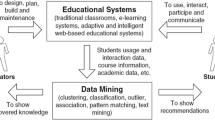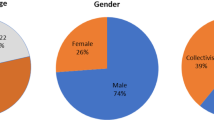Abstract
This article presents results obtained in research regarding the academic performance of high school students at public schools in the Federal District of Brazil in 2015. Using CRISP-DM data mining methodology, we were able to achieve greater knowledge discovery than studies using traditional descriptive statistical analysis. Subsequently, our data shows that the variables, ‘grades’ and ‘absences’, are not the only attributes relevant to whether a student will fail at the end of the school year. Thus, this study presents data indicating other frequently reported attributes relevant to potential academic failure in this context, as well as a detailed explanation of the methodology, and the steps taken to obtain this data.
Access this chapter
Tax calculation will be finalised at checkout
Purchases are for personal use only
Similar content being viewed by others
Notes
- 1.
According to the Brazilian public software portal [6]. The iEducar software aims to centralize the information of a school system, which may be local, state, or even federal, depending on customizations that are possible within the system to suit each of their specific needs. Besides this main purpose, iEducar was designed to use less paper, eliminating the need to duplicate documents, and reducing the time needed to respond to requests, thus streamlining the work done by public workers.
References
Reis, E.: Estatstica Descritiva, 245 p. Edies Slabo Lda, Lisboa (1991). ISBN 972-618-060-0
Romero, C., Ventura, S.: Educational data mining: a review of the state of the art. IEEE Trans. Syst. Man Cybern. Part C: Appl. Rev. 40(6), 601–618 (2010)
Barnes, T., Desmarais, M., Romero, C., Ventura, S.: Presented at the 2nd International Conference on Educational Data Mining, Cordoba, Spain (2009)
Baker, R.: Data mining for education. In: McGaw, B., Peterson, P., Baker, E. (eds.) International Encyclopedia of Education, 3rd edn. Elsevier, Oxford (2010)
Koedinger, K., Cunningham, K., Skogsholm, A., Leber, B.: An open repository and analysis tools for fine-grained, longitudinal learner data. In: Proceedings of the 1st International Conference on Educational Data Mining, Montreal, QC, Canada, pp. 157–166 (2008)
https://softwarepublico.gov.br/social/i-educar. Accessed July 2016
Romero, C., Ventura, S., De Bra, P.: Knowledge discovery with genetic programming for providing feedback to courseware author. User Model. User-Adap. Inter.: J. Personalization Res. 14(5), 425–464 (2004)
Raghavan, S.N.R.: Data mining in e-commerce: a survey. Sadhana J. 30(2/3), 275–289 (2005)
Hanna, M.: Data mining in the e-learning domain. Campus-Wide Inf. Syst. 21(1), 29–34 (2004)
Merceron, A., Yacef, K.: Educational data mining: a case study. In: Proceedings of the International Conference on Artificial Intelligence in Education, Amsterdam, The Netherlands, pp. 1–8 (2005)
Baker, R., Yacef, K.: The state of educational data mining in 2009: a review and future visions. J. Educ. Data Mining 1(1), 3–17 (2009)
Castro, F., Vellido, A., Nebot, A., Mugica, F.: Applying data mining techniques to e-learning problems. In: Jain, L.C., Tedman, R., Tedman, D. (eds.) Evolution of Teaching and Learning Paradigms in Intelligent Environment. SCI, vol. 62, pp. 183–221. Springer, Heidelberg (2007)
http://www.kdnuggets.com/polls/2014/analytics-data-mining-data-science-methodology.html. Accessed July 2016
Azevedo, A., Santos, F.: KDD, SEMMA and CRISP-DM: a parallel overview. In: IADIS European Conference Data Mining (2008)
Chapman, P., Clinton, J., Kerber, R., Khabaza, T., Reinartz, T., Shearer, C., Wirth, R.: CRISP-DM 1.0 step-by-step data mining guide. SPSS (2000)
Santos, M., Azevedo, C.: Data Mining: Descoberta de Conhecimento em Bases de Dados. FCA ed., Lisboa (2005)
http://www.h2o.ai/product/flow/. Accessed July 2016
http://www.h2o.ai/verticals/algos/gbm/. Accessed July 2016
Author information
Authors and Affiliations
Corresponding author
Editor information
Editors and Affiliations
Rights and permissions
Copyright information
© 2017 Springer International Publishing AG
About this paper
Cite this paper
Fernandes, E., Carvalho, R., Holanda, M., Van Erven, G. (2017). Educational Data Mining: Discovery Standards of Academic Performance by Students in Public High Schools in the Federal District of Brazil. In: Rocha, Á., Correia, A., Adeli, H., Reis, L., Costanzo, S. (eds) Recent Advances in Information Systems and Technologies. WorldCIST 2017. Advances in Intelligent Systems and Computing, vol 569. Springer, Cham. https://doi.org/10.1007/978-3-319-56535-4_29
Download citation
DOI: https://doi.org/10.1007/978-3-319-56535-4_29
Published:
Publisher Name: Springer, Cham
Print ISBN: 978-3-319-56534-7
Online ISBN: 978-3-319-56535-4
eBook Packages: EngineeringEngineering (R0)




